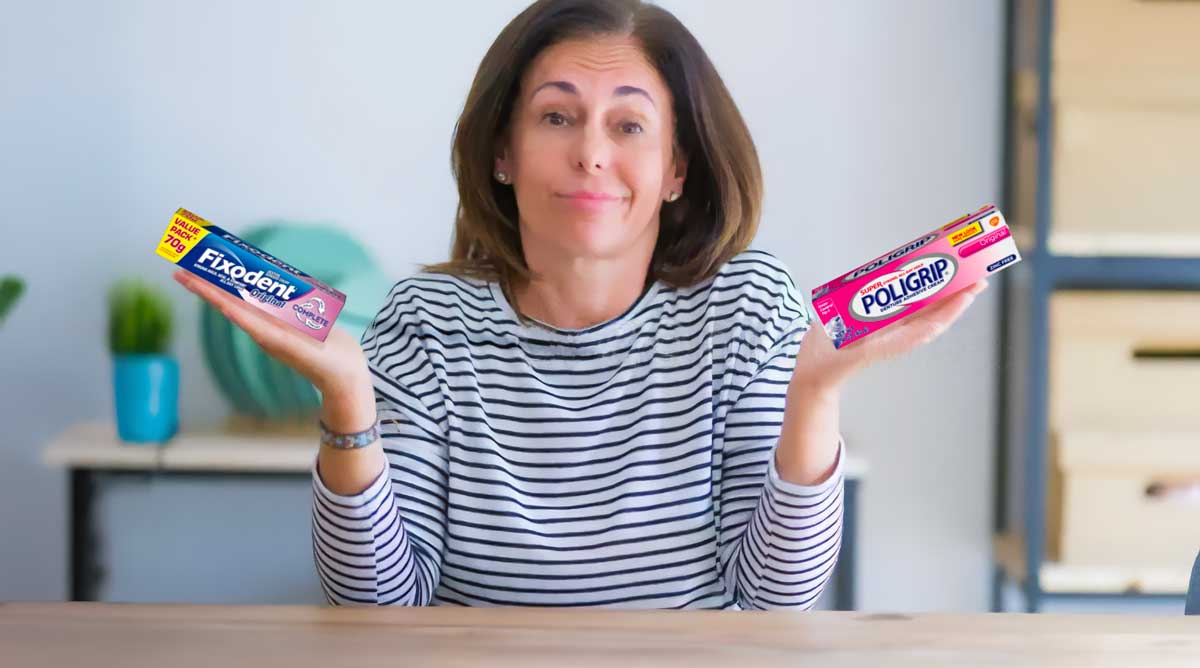
Denture adhesives can feel confusing, but understanding their safety, limits and real role helps denture wearers protect comfort, confidence and long term oral health. Many people start using adhesive because a friend recommends it, not because a dentist advised it. Others reach for a tube when dentures begin to feel loose with age. Some worry silently that they are using too much every single day. According to our editor’s research, a lot of this anxiety comes from unclear instructions on packaging. A simple, clear overview of when denture adhesives are helpful, and when they are a problem, can already reduce that worry.
Why do people use denture adhesives?
Most denture wearers want one main thing from their dentures, which is security. They want to speak, laugh and eat without worrying that the dentures will slip. Adhesives can give a feeling of extra grip between the plastic base and the gums. That extra layer can reduce tiny movements and stop food crumbs from sneaking underneath. For new denture wearers, adhesive can also offer short term reassurance during the adjustment period. As a result of our editor’s reviews, dentists often see confidence improve when a small, correct amount is used. The key point is that adhesive should support a reasonably good fit, not hide a very poor one.
What ingredients are in denture adhesives?
Most denture adhesives are based on sticky polymers that swell slightly when moist. These ingredients help create a gentle seal between the denture and the gum surface. Many creams also contain flavourings, preservatives and colouring agents. Older formulas sometimes included zinc to strengthen the hold. Today, many brands offer zinc free versions, because long term heavy zinc intake has been linked with nerve problems in rare overuse cases. According to our editor’s research, products without zinc are now widely available in pharmacies. In normal, directed use, both types aim to stay mostly on the denture, not be swallowed.
Are denture adhesives safe when used correctly?
Used in the recommended small amounts, denture adhesives are generally considered safe. Regulatory bodies and professional organisations review available data and product testing. Their overall message is that normal use, following package directions, is not expected to cause harm. A thin layer or a few pea sized dots once a day are typical instructions. Adhesive should not ooze out around the edges when you bite down. According to our editor’s research, patients who stay within these limits rarely report serious side effects. Any discomfort, irritation or unusual symptoms should still prompt a discussion with a dentist or doctor.
When can denture adhesives become risky?
Problems tend to appear when people treat adhesive as glue for badly fitting dentures. Using large amounts several times a day can lead to swallowing more of the product. This is especially relevant for older zinc containing creams, where extreme overuse has been linked with numbness or tingling in the hands and feet. Constant overuse can also mask changes in the gums and bone under the denture. The denture may rock and rub the tissues, causing sore spots and faster bone loss. As a result of our editor’s reviews, professionals consistently warn that increasing adhesive needs usually signal a fit problem. In simple terms, if a tube empties far faster than the instructions suggest, something is wrong.
Are denture adhesives really necessary?
Strictly speaking, a very well made and well fitting denture can work without any adhesive. Many patients manage perfectly with careful design and regular maintenance alone. However, the reality of everyday life is sometimes different. Saliva quality, bone shape, facial muscles and expectations vary widely between people. According to our editor’s research, a modest amount of adhesive can meaningfully improve comfort and confidence for many wearers. That does not make adhesive mandatory, but it makes it reasonable when used thoughtfully. The important idea is that adhesives are an aid, not a cure for poor dentures.
How dentists decide if you should use adhesive
A dentist will usually start by examining the denture fit and the supporting gums. They check how firmly the denture sits when you speak and bite. Pressure points, rocking and visible gaps are all important clues. If the fit is basically acceptable, a small amount of adhesive may be suggested for extra security. When the fit is clearly poor, the dentist will likely recommend relining or remaking the denture. As a result of our editor’s reviews, professionals see better long term outcomes when fit issues are addressed early, not hidden under layers of cream. The dentist can also recommend a suitable type of adhesive and explain where to apply it.
Practical tips for safer adhesive use
In practice, less adhesive is usually better than more. A thin, even application on a clean, dry denture base helps avoid lumps and oozing. If the material squeezes out when you seat the denture, that is a sign of overuse. Adhesive should normally be applied once in the morning and then left alone. Reapplying several times a day suggests that the denture is unstable or the product is unsuitable. According to our editor’s research, a standard tube should last several weeks for someone with upper and lower dentures. Cleaning the adhesive off both the denture and the gums every night is equally important. This routine gives the tissues a rest and allows the dentist to spot early irritation.
Common myths about denture adhesives
One common myth is that strong adhesive can “fix” any loose denture. In reality, no amount of cream can correct a base that no longer matches the gums. Another myth is that more adhesive automatically means more security. Beyond a small amount, extra product often creates mess rather than better hold. Some people also believe that adhesives are unsafe for everyone, because they heard about zinc related problems. According to our editor’s research, those serious cases involved very heavy, long term overuse. Modern guidance emphasises modest quantities, regular dental reviews and considering zinc free formulas where appropriate. When used this way, adhesives are generally accepted as low risk.
Lifestyle and denture fit over time
Even the best denture does not stay perfect forever. After teeth are removed, the jawbone slowly reshapes, especially during the first years. Weight changes, illnesses and certain medications can also alter the mouth. These shifts mean that a denture which once fit like a glove may gradually loosen. Some people respond by steadily increasing adhesive amounts instead of visiting their dentist. As a result of our editor’s reviews, this pattern often continues for years before professional advice is sought. Regular check ups allow small adjustments or relines before major problems develop. Adhesive can then return to its proper role as a helper, not a crutch.
When to see your dentist about adhesive problems
Certain warning signs should prompt a timely appointment. If you need noticeably more adhesive than before, something has changed. Persistent sore spots, ulcers or red areas under the denture are also reasons for review. Numbness, tingling, unexplained weakness or balance changes should be discussed urgently with a doctor, especially if adhesive use has been heavy for years. Difficulty cleaning the product off your gums or denture every night suggests that the amount is too high. According to our editor’s research, dealing with these issues early usually allows simpler solutions and better comfort. Waiting rarely makes the situation easier.
